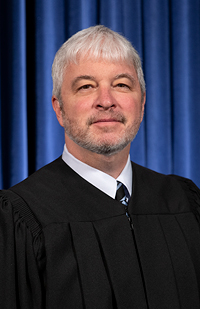Supreme Court Justice Calls for Plea Agreement Reform

Ohio Supreme Court Justice Michael P. Donnelly

Ohio Supreme Court Justice Michael P. Donnelly
In an article being published by the Ohio State Journal of Criminal Law, state Supreme Court Justice Michael P. Donnelly calls for reforms in the criminal plea negotiation process.
The reforms include:
- Abolishing plea deals made behind closed doors
- Providing uniform guidance to trial court judges when determining whether to accept or reject a plea agreement
Justice Donnelly also wants to eliminate “sentencing by ambush,” where a defendant enters a plea believing he or she has negotiated some benefit but is “completely unaware” about what the state intends to advocate for, at the later sentencing hearing. “The state then advocates and obtains a severe sentence so the benefit turns out to be illusory,” he said.
Justice Donnelly is a critic of “fictional” pleas, in which defendants plead guilty to crimes they did not commit, and do so with the knowledge of the prosecutor, defense attorney and judge. He said he came to reject these schemes during his first term as a Cuyahoga County Common Pleas Court judge, when he realized they are unfair to the two main participants in a case: the accused and the victim.
“It was the biggest epiphany of my legal career,” Justice Donnelly said. “No stakeholder in the plea negotiation process, including the judge, should ever say anything in chambers and off the record that he or she would not repeat verbatim in open court while on the record.”
From that day forward, Justice Donnelly never looked back.
“When parties are placed on the record, it naturally forces the adversaries to focus on the strengths and weaknesses of the case. No one wants to be caught lying or embellishing the facts on the record,” he wrote. But when these discussions take place in open court and on the record, “the parties focus on their positions and the known facts of the case, and everyone in the process, including the judge, is held accountable for what they say.”
Transparent proceedings will eliminate pleas based on legal fictions and provide defendants with an understanding of the benefit they are receiving in exchange for the admission they are providing, Justice Donnelly wrote.
The article is entitled “Truth or Consequences: Making the Case for Transparency and Reform in the Plea Negotiation Process.” The journal is published by the Ohio State University Moritz College of Law.
Justice Donnelly advocates for creating a centralized database that tracks every criminal sentence issued in Ohio that will be available to prosecutors, defense counsel, and judges.
The database will allow meaningful comparisons and analyses and provide guidance to trial courts so they can “achieve both consistency and proportionality in criminal sentencing,” he wrote.
Ohio State law Professor Ric Simmons said he appreciated Justice Donnelly’s expertise on the subject.
"The Ohio State Journal of Criminal Law always seeks to provide thought-provoking articles that are relevant to today's legal profession,” Professor Simmons said. “When we heard that Justice Donnelly was one of the national experts on fictional plea bargains, we knew this was the kind of topic that we would want to discuss in the journal.”
“We were very pleased when he accepted our invitation to write the article for us. We usually publish articles by law professors and other academics, and it is a rare privilege to have the opportunity to publish a piece from a sitting state Supreme Court Justice," Simmons said.
View the article in PDF form. View the article on the site of the Ohio State Journal of Criminal Law.


